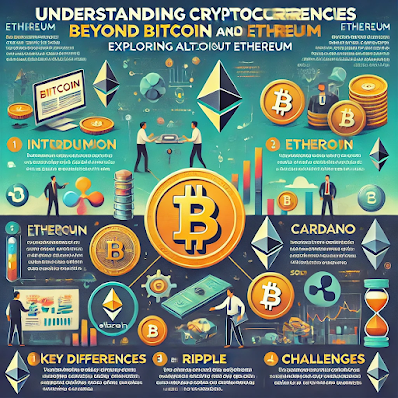Bitcoin may have been the first cryptocurrency, but it is not the only one. The world of digital assets has expanded with a variety of alternative cryptocurrencies, commonly known as altcoins. Among the most popular is Ethereum, which has revolutionized the way we think about blockchain technology. This article will explore what altcoins are, the unique features of Ethereum, its differences from Bitcoin, and why understanding altcoins is essential for anyone delving into the cryptocurrency ecosystem
What Are Altcoins?
Altcoins are alternative cryptocurrencies introduced after Bitcoin to enhance or expand upon the capabilities of the original cryptocurrency. The term "altcoin" combines "alternative" and "coin" and represents a wide range of digital assets such as Ethereum, Litecoin, Ripple, and Cardano. Each altcoin typically introduces a new functionality, an improvement to Bitcoin's technology, or focuses on solving specific blockchain challenges. For more insights into altcoins, visit CoinGecko’s Altcoin Page
Ethereum: A Comprehensive Overview
What is Ethereum?
Launched in 2015 by Vitalik Buterin, Ethereum is not just a cryptocurrency but a decentralized platform enabling developers to create distributed applications (dApps) and execute smart contracts. Its native cryptocurrency, Ether (ETH), powers transactions and operations within the Ethereum network. To learn more about Ethereum, visit Ethereum’s Official Website
What Makes Ethereum Unique?
Ethereum was designed to improve blockchain technology by offering a platform for programmable applications. It provides a versatile foundation for various blockchain-based projects, ranging from decentralized finance (DeFi) to non-fungible tokens (NFTs) and beyond
Key Differences Between Ethereum and Bitcoin
Purpose and Use Cases
Bitcoin serves as a digital currency and a store of value while Ethereum functions as a platform for developing decentralized applications and facilitating smart contracts in addition to its role as a cryptocurrency
Consensus Mechanism
Bitcoin employs the energy-intensive Proof of Work (PoW) system to validate transactions while Ethereum, after its Ethereum 2.0 upgrade, transitioned to Proof of Stake (PoS) to enhance energy efficiency and scalability
Transaction Speed
Bitcoin handles approximately 7 transactions per second while Ethereum supports over 15 transactions per second and continues to improve its speed and scalability through Layer 2 solutions
Complexity and Flexibility
Bitcoin’s blockchain is designed to be simple and secure while Ethereum offers a robust platform for building blockchain-based applications, allowing developers to create customized solutions
Notable Altcoins Beyond Ethereum
Litecoin
Designed in 2011 by Charlie Lee, Litecoin is a faster and more cost-effective alternative to Bitcoin, making it ideal for smaller, more frequent transactions. Learn more about Litecoin at Litecoin’s Official Site
Ripple
Ripple focuses on enabling fast cross-border payments for banks and financial institutions. Explore Ripple’s offerings at Ripple
Cardano
Known for its emphasis on security and sustainability, Cardano employs a layered blockchain architecture to improve scalability and efficiency. Visit Cardano’s Official Site
Polkadot
Polkadot is designed to connect multiple blockchains, enabling data and asset interoperability. For further details, check out Polkadot’s Website
Solana
Solana provides a high-speed blockchain infrastructure optimized for decentralized applications and DeFi solutions. Discover more about Solana at Solana’s Official Website
Challenges of Altcoins
While altcoins offer innovation and opportunity, they also come with challenges. The market for altcoins is often more volatile than Bitcoin. Some altcoins are fraudulent or lack a clear long-term vision. The competitive nature of the crypto market means many altcoins fail to gain traction or disappear entirely
Benefits of Learning About Altcoins
Understanding altcoins offers several advantages, including a broader perspective on cryptocurrency and blockchain technology. Insights into innovative solutions and investment opportunities. The ability to identify promising projects that align with long-term trends and technological advancements
For additional resources, explore Binance Academy’s Altcoin Learning Section or Investopedia’s Cryptocurrency Resources
Conclusion
Altcoins like Ethereum demonstrate that cryptocurrency extends far beyond Bitcoin. These digital assets showcase how blockchain technology can be applied to various industries and use cases. Whether you are an investor or a tech enthusiast, understanding altcoins is key to navigating and benefiting from the growing crypto landscape

